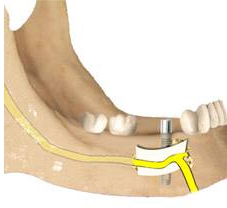#88, opp. to MORE Super Market, Marathahalli Outer Ring Road, Bangalore-560037
#88, opp. to MORE Super Market, Marathahalli Outer Ring Road, Bangalore-560037
Nerve Repositioning
This is a procedure performed in the back portion of the lower jaw to increase the bone height for implant placement.
So (Inferior Alveolar) Nerve repositioning is a procedure in which the nerve is moved or repositioned from its normal position to outer aspect of the bony wall thereby increasing the bone height facilitating implant placement.
Inferior Alveolar Nerve is present in the back portion of the lower jaw lies horizontally.
Only portion of bone present above the nerve can be utilised for implant placement in this region. Implants Should be placed at least 1 mm above the nerve to avoid injury to the nerve. Hence bone present below the nerve cannot be utilised for implant placement.
But in many patients, bone height in this region will be inadequate even for placing short implants
Hence bone height needs to be increased for implant placement.

Involves harvesting blocks of bone either from a different place in the same bone or from other bones and fixed onto the jaw bone using titanium screws.
Implants can be placed after 3-4 months when the grafted bone has fused with the existing bone. But this procedure has some limitations.
Involves removing small linear block of bone from the outer side of the jaw bone overlying the nerve. The nerve is gently pulled out and kept away from its normal position.
This will increase the bone height as portion of bone below the nerve can also be utilised for implant placement.
Implants are placed and the bone defect which was created to reposition the nerve will be closed with bone graft.